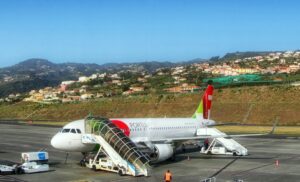Public prosecutors object to works without environmental impact study
The government and airports operator ANA (owned by French group Vinci) are rallying in objection to an administrative action, brought by the Public Prosecutor’s Office, that could delay ‘improvement works’ at Lisbon’s Humberto Delgado airport.
The works, which involve expansion of the airport and increased flights until a new airport in Alcochete has been built, have not been welcomed by Lisbon residents, who already suffer from the noise and dangerous levels of air pollution generated by the inner city terminal.
The Public Prosecutor’s action focuses on what it believes is a need for an environmental impact study for the first phase of the ‘improvements’ – which actually imply the expansion of Terminal 1 and the creation of an aircraft apron.
As reports explain, the Public Prosecutor’s Office supports the need for a study at this stage “since no project at (Humberto Delgado airport) has been subject to an environmental assessment since 2006”.
There is also the matter of multiple mitigation works – including the sound-proofing of worst affected homes – which has never fully gone ahead.
According to Lusa, the government has said it is using the legal time limits (30 days) to analyse the Public Prosecutor’s action “in order to present the respective challenge”.
For now, the action does not suspend works immediately, but it “could lead to delays” if it is decided that an environmental impact study should be carried out.
ANA Airports Authority meantime has said it ‘laments the situation’ which it sees as “aiming to make it impossible to carry out improvement works at Humberto Delgado Airport immediately”.
ANA’s statement refers to the works designed “to ensure better service conditions for passengers, with more space in the terminals and a reduction in boarding and disembarking by bus, thus improving the carbon footprint of ground operations”.
The company does not refer to how the works affect Lisbon’s long-suffering residents who will be aware by now of the report which stressed that ultrafine particles emitted by aircraft jeopardises not only the health of those already living, but of the generations to come – also impacting on the brain development of unborn children.
Environmental associations like Quercus and ZERO have played their part in warning of the human/ health costs of expanding the inner city airport, when alternatives already exist.
But up until now, authorities have taken little notice. Portuguese environment agency APA has argued that an environmental impact study is not necessary at this juncture “since it would not alter the increase in the infrastructure’s capacity” – but one will be required when it comes to increasing flight capacity.
“The environmental impact study (EIA) to be carried out should consider as a reference situation the number of flights declared in the request for prior appraisal for the ‘Pier Sul, Central e Apron Sul’ project (38 movements per hour) and its future evolution, namely until it reaches the maximum capacity of 45 movements per hour,” explained APA in an opinion issued last month.
ANA shares the same view, arguing that improving the operating conditions of Lisbon airport’s terminal 1 is not related to, “nor does it have the effect of increasing aircraft movements, which are limited by airspace capacity”.
The works at Humberto Delgado airport, awarded to a consortium of Mota-Engil and Vinci, involve an investment of more than €233 million euros and are aimed at mitigating the infrastructure’s current congestion until the start of the new Luís de Camões airport in Alcochete (which will almost certainly take a decade, even if current plans envisage an opening in 2034). ND
Source material: LUSA/ SIC Notícias




















